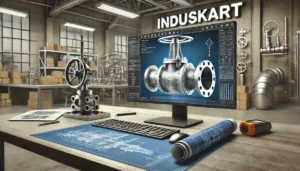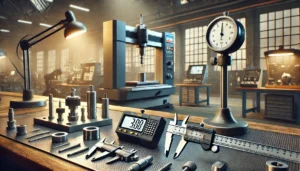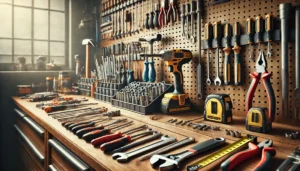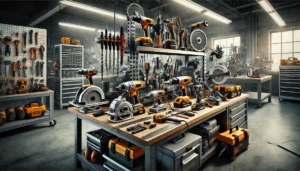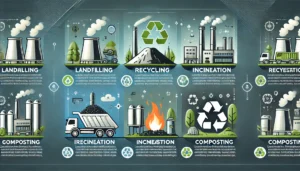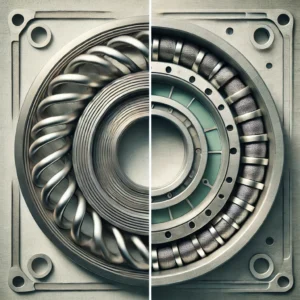An Evolution Shaped might be the most clean answer. It’s a revolution that is silent, where new technology is introducing efficient and precise cnc machining processes into the heart of manufacturing. cnc machining is likely to improve operations but it is also true that a lot of time tested methods of traditional manufacturing still holds its place in the market. This brings up, is CNC machining really helping alter the mark of modern industrial countries or does manual workmanship still continue to win?
With over 15 years of experience Induskart emerged as one of the key players in this Evolving Industry, Induskart is known for offering a range of modern and archiac manufacturing tools enabling them to serve as a one stop shop for varying industrial needs. They have more than 500,000 collections of skus which cuts across sectors such as infrastructure to petrochemical engineering, enabling them to serve for both modern and archaic manufacturing. Their collection puts Induskart into perspective on the scope and scale of processes today.
Section 1: Understanding Traditional Manufacturing Methods
Key Traditional Methods:
- Manual milling: It consists of controlling the movement of a cutter that operates on the workpiece or, can be controlled from outside the machine.
- Turning: A procedure in which a cutting tool is applied to a rotating workpiece and the material is removed and shaped, typically using a lathe.
- Drilling: The process of creating holes in a workpiece, utilizing a drill bit.
- Grinding: The process of polishing and shaping work pieces using an abrasive wheel.
Strengths and Limitations:
Strengths:
- Adaptability: Traditional techniques can be utilized on almost any material or design.
- Lower Initial Cost: Setting these processes up is usually cheaper compared to CNC machines.
- Skill Development: Improves the skills of the operator.
Limitations:
- Time-Consuming: These processes take considerably more labor and time when compared to automated techniques.
- Less Precision: A greater chance of human error makes these processes less accurate.
- Scalability Issues: Due to high time and labor costs, these methods are not suited for mass production.
Applications in Industry:
- Custom and Artisanal Work: Most suitable for custom and custom-made artisanal goods where hand-work is appreciated.
- Repair and Maintenance: Very important in a repair shop or maintenance department where adaptability and practical creativity are essential.
- Small Batch Production: The processes can be used for limited production runs as long as the expense of setting a CNC is deemed unjustifiable.
Section 2: The Rise of CNC Machining
CNC (Computer Numerical Control) Machining Explanation:
- Definition: This fabrication technique refers to the process of manipulating the movements of factory tools and machinery using pre-written software code via a computer.
- Process: It includes turning a digital design into a set of instructions that operate the machining tools.
- Capabilities: This process is capable of making complex cuts done at high precision.
Advantages Over Traditional Methods:
- Precision and Consistency: CNC Machine providers claim that their equipment has no limitations and provide exact and accurate parts with CNC machining.
- Increased Speed and Efficiency: Automation all but guarantees that machines will work faster than people and so is the case for mass production.
- Flexibility in Design: The use of computers allows the user to create very complex and intricate designs that are impossible to do by hand.
- Reduced Human Error: Reduction of mistakes done increases the quality of the work done by reducing the handling done by human hands.
- Lower Long-Term Costs: Though initially expensive, the effective long-term benefits outweigh the costs due to the value of time and accuracy.
Industries Benefiting from CNC Machining:
- Aerospace: For precision components in aircraft.
- Automotive: In the production of complex, high-precision parts.
- Healthcare: For medical devices requiring exact specifications.
- Electronics: In manufacturing small, intricate components.
Induskart supports these industries by providing CNC tools and equipment, knowing the importance for precision CNC machining industries that rely on modern developed technology.
Section 3: Comparative Analysis
Accuracy, Speed, Cost, Scalability, Scalability, Versatility:
- Accuracy: While accuracy is a strong suit of CNC machining, it is also offset by an operator’s skill in more traditional techniques.
- Speed: Especially when performing larger production runs, CNC machines will always be faster.
- Cost: While traditional methods may require less initial investment, CNC will prove more economical in the long run due to operational efficiency when producing in bulk.
- Scalability: CNC systems can sustain an aggressive increase in output without a compromise in quality.
- Versatility: They can also switch from one design to another with little disruption making CNCs more flexible.
Specific Examples Where One Method Is Preferable Over The Other:
- Custom One-Off Projects: For artisanal work, bespoke pieces requiring more attention to detail will be better served by traditional methods.
- Large Scale Production: Used in mass manufacturing, speed, consistency, and economy of CNC execution makes this technology preferred.
- Complex Designs: Parts with tighter tolerances and intricate designs should employ the use of CNC.
- Budget Constraints: Limited budgets paired with smaller quantities will more contextually fit into traditional methods.
Section 4: The Role of Technology and Automation
How Technology is Influencing Both Methods:
- Enhanced Precision and Control: Both CNC and traditional methods have benefited greatly from the furthering of software technologies and automation increasing precision.
- Digital Integration: Integration with digital systems for better monitoring and enhanced efficiency.
- Adaptation of Traditional Methods: Even traditional methods are being enhanced with the use of technology to improve performance.
The Future of Manufacturing With AI and Robotics:
- Smart Manufacturing: The innovations of AI and robotics carry us towards the ideal of smarter, more efficient manufacturing.
- Predictive Maintenance: AI algorithms have the ability to anticipate maintenance needs for machines, which increases productivity by minimizing downtime.
- Customization at Scale: Individualized production at large scales is made possible through the use of robotics and AI.
Induskart’s Commitment to Staying Ahead with Technologically Advanced Solutions:
- Product Range: Providing tools and machinery that are crafted with the latest techniques and technologies.
- Innovative Partnerships: Working alongside technologically advanced companies to develop the most modern solutions for their clients.
- Investment in Innovation: Induskart is committed to new technologies to ensure that their products always lead the market.
Section 5: Case Studies or Real-World Applications
Other Abridged Case Studies or Illustrative Examples from Diverse Sectors:
- Aerospace Industry: Machining aerospace components with CNC lathes and milling machines ensures high precision, as even the slightest errors are magnified.
- Automotive Sector: Enhanced vehicle production through the installation of robotic assembly cells for mass production.
- Custom Fabrication: Local workshops employ adaptable and skilled methods for custom fabrication work.
How Induskart has Supplied Tools/Equipment for These Applications:
- CNC Tools for Precision: Supplying CNC tools and equipment for industries with very high precision requirements, such as aerospace and automotive industries.
- Traditional Tools for Custom Work: Providing a wide range of hand tools for industries and workshops focused on custom or artisanal projects.
- Automation Equipment: Providing automation and robotics solutions for industries that are advancing toward smart manufacturing.
Section 6: Myth vs. Fact
Disputing Popular Myths About CNC and Traditional Manufacturing:
- Myth: CNC Machining is Always More Cost-Effective.
Fact: CNC is cost-effective for mass production, but traditional methods require less cost for small-scale or custom work.
- Myth: Traditional Manufacturing is Outdated.
Fact: Craftsmanship, versatility, and flexibility still have worth, especially in marked fields of economy for tailored efforts.
- Myth: CNC Machining Lacks Customization.
Fact: Customization, particularly for complex designs and precision parts, is a hallmark of CNC machining.
Presenting Factual Insights Supported by Industry Data:
- Data on Efficiency: Studies show the use of CNC methods can enhance production speed up to 70% relative to other techniques.
- Quality and Precision: Research indicates a substantial decrease in margin of error alongside an improvement in product quality with the use of CNC methods.
- Skill and Adaptability: Industry surveys indicate that there is still a demand for skilled manual machining for custom or repair work in some industries.
Section 7: Choosing the Right Method for Your Project
Factors To Consider:
- Material: Some machining processes are tailored to specific materials.
- Complexity: It can often be advantageous to use CNC for highly intricate designs.
- Volume: There is usually a greater advantage with CNC machining in high-volume projects.
- Budget: Evaluating cost effectiveness against the project scope and budget constraints.
How Induskart Can Help You Make The Right Choice With Their Expert Team:
- Expert Consultation: Assisting the clients to select the most appropriate procedure to achieve the desired outcome is one of the primary responsibilities of any expert.
- Diverse Product Range: A comprehensive selection of tools and equipment for CNC and traditional methods is offered.
- Custom Solutions: Solutions are developed for each individual project according to the standards of the industry and the client’s needs.
Conclusion
In conclusion, it is evident that the debate about whether CNC machining and traditional manufacturing methods is central to one being better than the other does not apply here. This particular case study underscores the profound impact of evaluating the capabilities and limitations of each approach relative to the material, complexity, volume, and budget, and integrating various methods to achieve optimal results.
Induskart steps in as a worthy partner in this decision-making. Their experience paired with an impressive portfolio of CNC and traditional manufacturing products prove that they go beyond catering to their clients’ needs—they offer complete solutions. By providing the right tools and guides to clients, Induskart proves that they are an important part of the advancing impact of manufacturing.
Induskart proves its mettle in the manufacturing sector by remaining reliable and adapting to the needs of the clients. Their wide CNC and traditional manufacturing products enable them to offer complete solutions, rather than simple services. Induskart is evolving and adapting to the needs of their customers, thus proving to be essential in advancing manufacturing.


